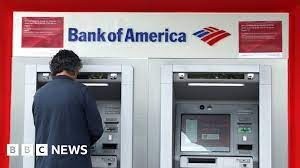

Additionally, regulators found that the bank “double-dipped” fees from consumers and withheld promised reward bonuses.
Numerous thousands of customers are impacted by the violations at the second-largest bank in the US, some of which go back to 2012, according to regulators.
The results of the probe have not been confirmed or refuted by Bank of America.
The Consumer Financial Protection Bureau (CFPB) and Office of the Comptroller of the Currency (OCC) have ordered the bank to repay clients and pay a total of $150m in fines.
The CFPB predicted that customer refunds would total more than $80 million.
According to the regulator, Bank of America improperly registered for and enrolled people in credit card accounts without getting their permission or knowledge in order to facilitate bank personnel in meeting their goals for sales incentives.
Customers “suffered negative effects to their credit profiles” and were imposed costs that were not warranted, according to the CFPB.
Additionally, Bank of America is charged with charging double-dipping fees when a customer’s account did not have enough money in it.
People who had a transaction refused were charged $35. However, Bank of America permitted costs to be incurred multiple times for the same transaction.
According to the lender, it no longer charges the $35 cost for inadequate cash and has cut back on overdraft fees.
Additionally, Bank of America promised to maintain the policy in place for at least three years after eliminating sales targets for its credit card employees in January 2023.
The CFPB’s Rohit Chopra stated: “Bank of America started accounts without authorization, double-dipped on fees, and wrongfully withheld credit card rewards.
The public now saves more than $5 billion annually, according to the White House, after many banks, including Bank of America, voluntarily discontinued or lowered the fees.
According to Bank of America, modifications taken in the first half of 2022 have caused a more than 90% decrease in the revenue it received from overdraft and non-sufficient fund fees.
In 2014, the bank was penalized $20 million and ordered to make more than $700 million in restitution to consumers for misleading marketing and unauthorized charges on its credit cards. Additionally, it was penalized $225 million last year for mishandling the delivery of jobless benefits.